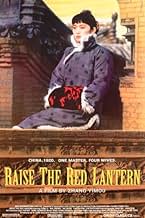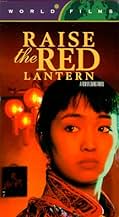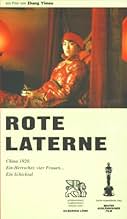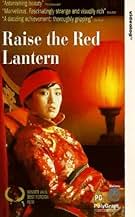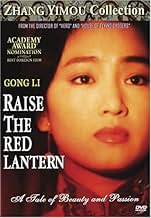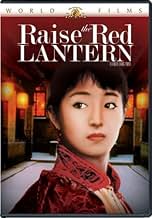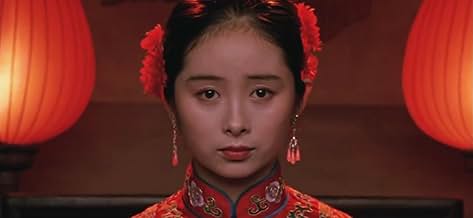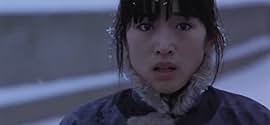China in the 1920s. After her father's death, Songlian is forced to marry the wealthy Master Chen. With three wives already, each living in a separate house, there is fierce competition for ... Read allChina in the 1920s. After her father's death, Songlian is forced to marry the wealthy Master Chen. With three wives already, each living in a separate house, there is fierce competition for his attention and the privileges that are gained.China in the 1920s. After her father's death, Songlian is forced to marry the wealthy Master Chen. With three wives already, each living in a separate house, there is fierce competition for his attention and the privileges that are gained.
- Nominated for 1 Oscar
- 23 wins & 15 nominations total
- Songlian's Mother
- (voice)
- Old Servant
- (as Zhengyin Cao)
- Dr. Gao
- (as Zhihgang Cui)
- Kids - Concubines
- (uncredited)
- Director
- Writers
- All cast & crew
- Production, box office & more at IMDbPro
Featured reviews
This has two known qualities that you, dear reader, can expect without knowing anything about the film itself.
First, you will know that this is a woman directed by someone deeply in love with her. This doesn't always produce great films, but when the director is inherently cinematic, it often evokes something deep in the viewer. There is nothing in the world like looking on the face the person you are centered on. A million subtle decisions are made in each scene, summing to an effect that cannot be missed. If this had poor narrative qualities (and some of their films did) it would still have this quality of seeing into a soulmate deeply enough to be able to animate the skin.
Its quite interesting when you consider the woman. If you see her outside of film, or in films made by ordinary eyes, she is quite ordinary. She has an atypical Chinese body: busty and widehipped. She is poised but doesn't have the neck or cheekboned face of other Asian women. Only under this man's eye is she a goddess. You can see this in the very first shot.
The second thing you can count on is the architectural anchoring of the thing. This man knows how to use space. He uses it in the cinematic narrative, for example, if you replay the shots where the house of death is shown, and then the last encounter with it... And if you understand why the decisions about handling distance and surfaces were made they way they were, you will have entered a zone where from now on you will not be able to reason without reasoning with place.
But there are other handlings of space: As with some of his other films, the building is a character. Its the noir narrator who sets the rules often arbitrary under which all characters are bound to operate, and which drives the narrative. Its a particularly western notion, this, and has gotten our hero in trouble, even banned. This part is following Welles and Kubrick.
But he goes further than either of them with this notion that the light both has agency of its own (it selects which of the four wives gets a foot massage and sex) and is a part of the fabric of the buildings. The redness changes the spaces it occupies, bringing intrigue with the sex, desire for several things. Its quite layered, what is going on. These lanterns are the real master; in fact the person who inhabits the master's body is hardly even there. We never see his face.
Because of the extensive use of hard planes and selfish light, there aren't many fabric effects here, as we'll see elsewhere.
I am tempted to designate this as one of my two allowed "must see before you die" films of 1991. But I'm in too good a mood to make such a serious decision.
Ted's Evaluation -- 3 of 3: Worth watching.
This is in my opinion, Zhang Yimou's greatest film, it is a triumph in film form and narrative. The haunting sounds of flutes, a significant visual and audio element that has a mythical quality due to it's importance to Songlian and becomes an unattainable item of the gods when it is removed from existence when it is burned, becoming a tragic reminder on the attempts to vanquish the personalities of not only Songlian but all of the concubines. It's slow burning nature may repel the masses but anyone who can get a copy, do so without fail, you will never regret it. I cannot stress the importance of this film, we may see it as a study on the oppression of women in China, but this is universal, we westerners once did the same thing not too long ago.
For me the cinematography is what sells the film, it is the best I have ever seen and ever will. If there is ever a film to promote the use of the three strip technicolour process once again, this is it. Long after you have finished your post film analysis, the light from the red lanterns will still be searing in your eyes.
I think of this as one of those movies that you aren't supposed to enjoy; it shocks you, and leaves you just as disturbed as, considering the subject matter, you should be. The miserable story of Yan'er, the servant girl, is especially painful to watch, and the same goes for the unfolding of the last few scenes. But I think the fact that I was so unsettled by this movie probably just goes to show how well it gets its points across. And along with the remarkable acting and directing, that's definitely something to be respected.
The story is one of classical simplicity, in in large part presented with the same classical, clear quality. The interplay of passion, jealousy, and revenge is reminiscent of Shakespeare, but, for me, more entertaining--if it's proper to speak of such ultimately somber and even horrifying subject matter as entertainment.
I unhesitatingly gave a vote of ten, and noticed that a full 33% of voters so far had done the same--very unusual.
When Roger Ebert called "Raise the Red Lantern" "breathtakingly beautiful," he wasn't exaggerating. But beyond its beauty, its moral seriousness, the fact that not for a moment is it "dumbed down" in the regrettable Hollywood fashion, its superb acting, and its almost unbelievably perfect pacing, make it a rare, rare experience.
"Red Sorghum," the only other Zhang Yimou film I've seen so far, I found somewhat propagandistic but gripping and visually stunning (even more so than "Raise the Red Lantern.") I will be making an effort to see more of this director's fairly extensive body of work.
It's a shame major theater chains don't schedule movies of this caliber instead of the torrent of commercialized Hollywood trash they foist on the public, which, alas, seems only too eager to wallow in more and more of it.
Did you know
- TriviaFilmed at the Qiao Family Compound near the city of Pingyao. The complex is now open for tours, however, nowhere is there any mention of the film.
- GoofsAround 01:18:59, there is a lot of smoke in front of the third wife. And there is almost no smoke in front of the second one.
- Quotes
The Third Concubine: Good or bad, it's all playacting. If you act well, you can fool other people; if you do it badly, you can only fool yourself, and when you can't even fool yourself, you just can fool the ghosts.
- How long is Raise the Red Lantern?Powered by Alexa
Details
Box office
- Gross US & Canada
- $2,603,061
- Opening weekend US & Canada
- $22,554
- Mar 15, 1992
- Gross worldwide
- $2,603,061
- Runtime2 hours 5 minutes
- Color
- Aspect ratio
- 1.85 : 1


